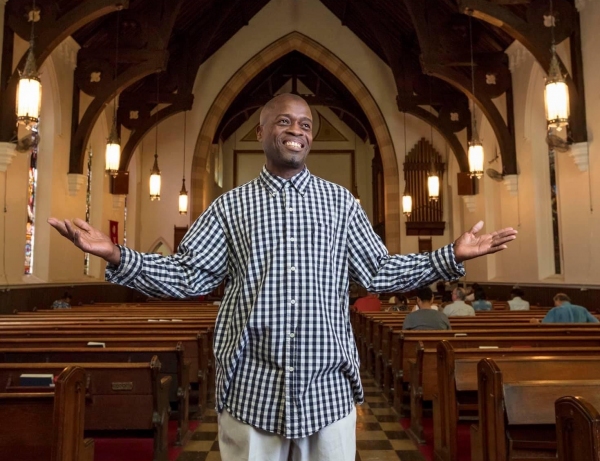Case Study
Raising leaders from within has become a way of life in this youthful and vibrant parish.

Church of the Messiah, Detroit, is a mixed-race, community-based church, with outreach a major part of our mission. We have built or rehabbed 200 units of affordable housing. We provide free internet services to low-income families in the neighborhood. We have a business incubation center, a community medical clinic, a community employment office, two solar powered charging stations, two urban farms, and an 84-member marching band that is a front for a literacy program aiming to get kids into college through music scholarships. The average age of the congregation is about 35, and 60 percent of the members are African American males under the age of 30. A big part of our success with the youthful population is our focus on combining ministry and activism.
Church of the Messiah is a Total Ministry Church, which means that we focus on equipping members of the laity to share fully in the ministry and authority of the church alongside ordained ministers. We intentionally raise leaders from within. The Rev. Barry Randolph, who now serves as priest and pastor, began as a volunteer tutor in the church’s after-school program in the 1990s. He was one of two from our church ordained in 2002, with eight other parishioners being commissioned for lay ministry by the Diocese of Michigan. All were raised up out of the congregation. This has been our model for more than 20 years. New members to the church know only this way of ministry, and they expect leaders to come from within the congregation. This kind of mutual ministry enables organic leadership and allows members to take ownership of what happens in their church without looking for help outside of the home church.
One of the great things about ministry at the church is our “open-door policy.” You don’t have to be a long-time member to get involved with many areas of our ministry. People are free to try things according to their interests, even if they are quite new to our church or have no prior experience of ministry.
Every year we do an annual asset assessment of our members, in which we ask what gifts, skills, talents, and interests they each have. We then invite them to join a particular group or ministry that might benefit from their participation, or we create a new space to accommodate their particular gifts and skills. This approach brings new and longtime members together in ministries of vested interests, and it allows people to work in ministry areas to which they feel called.
Many potential leaders are also identified by church ministry leaders running one of the church’s many outreach or “inreach” ministries. Current leaders look for outstanding individuals who are volunteering their gifts in a particular area or ministry, and invite them into greater participation and different roles.
One of the great results we’ve gotten from focusing on lay leaders is that our members know there is always a place for them in ministry. Ministry is done not just by the priest or the vestry, but by everyone in our church community. Lay leaders run our town hall meetings and our weekday radio show; they work with our neighborhood schools and help lead worship on Sunday. Our congregation expects to participate actively in the ministry of this church.
We currently know of four people who we believe will be interested in attending seminary and being ordained to the priesthood. We also have a thriving younger cohort of leaders. Half of our vestry is young people under the age of 30, and we take full advantage of the many services offered by our Diocese that can benefit new leaders, including vestry days, youth and young adult conferences, summer camp, leadership courses, and book studies.
Raising leaders from within our congregation has given us an opportunity to shape not just our own community, but also the wider church: We are showing how mutual ministry can draw people into greater participation in God’s work in the world.
Ordained in 2002, Barry Randolph has been the priest and pastor of Church of the Messiah in Detroit for over 20 years. Under his leadership the church has grown from 40 members in 2002 to over 200 members when Covid hit in 2019. Church of the Messiah is a diverse congregation, and 60% of its members are African American males under the age of 30.
Among his many accolades pastor Barry was named Michiganian of the Year by the Detroit News in 2019 and in the same year the city of Detroit named him as Detroit’s first ever Human Rights Leader of the Year. He is also a Chaplin and serves as the Dean of the Detroit churches for the Diocese of Michigan.